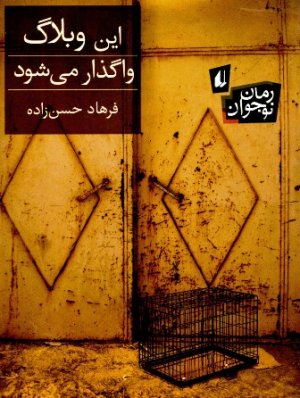This Weblog Will Be Transferred
• Author: Farhad Hasanzadeh• Publisher: Ofogh Publishing house
• Published in 2012
Dorna is a young girl who lives in Abadan. She finds a diary in a bookshop which is a true love story. She is so excited that she borrows the diary from the shopkeeper who is the writer of the diary.
She gradually uploads the story on her weblog, “A Set of Keys”, with the author’s permission. The readers of her weblog will know about Zal and his teenage love. Zal used to work and live in a birds’ store when the war started. He fell in love with a neighbor’s daughter, Fariba. But the onset of the war in Iran separated him from his love for a long time. Fariba’s mother, who was going to leave Abadan along with her daughters, left her keys of their house to Zal. This set of keys glued Zal to Abadan and their house for many years. Dorna shares the story with many people on her weblog. But the weblog cannot make people find Zal’s beloved one.
One way to attract the audience in a story is to tell a story in the
middle of another story. The reader will read two stories simultaneously. If the writer applies a novel style to present these two stories, it will be more attractive. He narrates an old story in form of a weblog.
This book has obtained 5 turtles out of 6 in the Flying Turtles list. It has won Shahid Ghanipoor’s Book Award. It was nominated for the Flying Turtle award in 2014, and was nominated in the 17th Kanoon Festival in 2014.
Chapter Sixteen: This Weblog Is Being Turned Over
Home >> DORNA >> Zal >> Comments >> Translator
Guys, I don’t know how to break this to you but I need to shut down this weblog. Well, maybe not shut it down but rather, turn it over, you know, hand it over to someone else.
Are you surprised? Well, don’t be! Stories never end, only our patience runs out. Maybe we lack stamina or the desert proves too formidable to cross and we have to turn back. We return to our homes and our lives. Back to where we started. I can’t write anymore. I mean, I should not write anymore. Whoever feels up to it can please step forward. Probably you’re saying “What’s going on? What the …? That Dorna! What a fake, she is copping out on us. No, don’t even go there. It’s not what you’re thinking.
We went to see him. Dad and I. It was around eleven in the morning when we went. We said salaam and sat down on stools. At first he wasn’t what you would call angry although he wasn’t exactly thrilled to see us either. Slowly, his mood became darker and darker.
Little-by-little, he assumed an accusatory posture. He kept directing glances at me then at Dad. Finally he said, “Why did you put my story on the internet?”
He said I’d ruined his reputation. He said a journalist had come wanting to do an interview with him. He said the journalist had read it on the internet and just like that, without warning had come from Ahwaz to interview him.
I said, “You yourself said that a written work becomes in the public domain after a period of thirty years.”
He said, “Right, and I sure made a big mistake. How was I supposed to know this would happen?! And besides that, you spiced the story up the way you wrote it. You put feathers and wings on it. In some places, you took all kinds of liberties and twisted it the way you wanted. Is this something we agreed to?”
I said, “Well, some parts I didn’t actually even include!Anyhow, is it really such a big deal?”
He said, “Is this a big deal? Suppose you tell us how this can be fixed? Child, I’m running a business here. I live here. I don’t want to be the talk of the town.
Yesterday this very CoffeeNet’s owner who is the son of Tailor Reza came and said to me, ‘I didn’t know you’d been through so many adventures.’ He said, ‘I thought you said Dad had gone to Sweden…?’
What am I supposed to tell him?
People think I’m crazy. They think Fariba and her family are made up, it’s a story. They think Zal has lost his mind. Zal should be locked up in the insane asylum…”
The truth is, I was somehow offended by his words. What he said really hurt me. Ifelt injured. Here, I had tried to do something good but ended up getting burnt. Dad wasn’t saying anything and it was like he wasn’t even there.He was giving me these super-duper special glances.
My eyes were burning holes in their sockets and my tears were about to burst the dam.
I looked at Zal’s white, unruly hair and said, “There’s something I want to say but I don’t know how to say it.”
He brought his head close to mine. He said, “Go ahead. Say it!”
It was too hard for me to get anything out. I looked at Dad. He gestured for me to go on. I couldn’t. I was tongue-tied. My brain was hung up.
Finally Dad broke the silence, “One individual sent a message that you should not wait for her.” The moment was charged with emotion. My heart was about to leap into my throat. His eyes got wide and his white eyebrows flew up: “Fariba?”
I nodded my head. Dad bowed his head.
With a long, drawn-out sigh, I said, “Yeah. She emailed me a long and detailed letter. She sends you her greetings. She’s living with her parents and husband in some city in the United Arab Emirates…”
I was not yet finished speaking when I saw him tremble and with shaking legs, he sat down on a stack of old, second-hand books. The sound of his husky voice shook my ear, “Is that what you wanted, girl?” and he placed his forehead on his elbow. “Please leave. Please go, go home. I don’t want to hear any more.”
It’s all over.
{Written by Dorna} on {Friday, 10 August 2012} at {19:18}
Leave a comment! ✉
@ @ @
Home >> Dorna >> Zal >> COMMENTS >> Translator
There are 1 comments. Begin comments:
A person who is waiting can’t go anywhere. Zal said this himself. Isn’t that right? Now that this weblog is supposed to be shut down or turned over, let me say one thing. “A person who is wandering around can never put their foot on the ground.” I want to be released from this wandering around. I want, one of these days, to put Latif and his wheelchair in the car and both of us to get up and come there from Isfahan.
Now maybe that Latif, with the situation and family that he’s found, has no need for Zal but I do. Maybe these things are meaningless for your generation. So be it. It’s not important. You know, I’m too tired to get happy about plastic bangles. My heart wants real bangles. The ones that give off a jingling noise.The real thing.Tell him this, Dorna dear…If you see him again, tell him this…
-Familiar stranger
End of comments. No more comments.
% % %
Home >> Dorna >> Zal >> Comments >> TRANSLATOR
Inbox. You have 2 new emails:
M at 7:45 AM, maryam@yahoo.com, wrote:
OMG, that was intense! I sort of saw something like this coming but not exactly this. And poor Dorna!She got exactly what was coming to her for re-publishing Zal’s story without his permission. And not only that, she changed stuff, she repurposed it to suit her own agenda. That’s just plain wrong.
Funny thing, I was bored to tears during the first half of this book, only wishing it would end. Now that it’s over, I’m just starting to like it. I’m starting to get the hang of looking between the lines for the most important bits. I actually miss being in the desert with Zal. I can’t believe I’m hearing myself say this but I almost wish the story would continue.
Hey, you know what? I have not been able to get our pilot out of my head. I keep trying to think of a way we could get a message to him. There must be a way! I’m thinking of Rumi’sThe Merchant and the Parrot. There are ways people can communicate with a message hidden in plain sight. You know those whistles they have for dogs? Dogs can pick up sounds at the higher frequencies which Humans don’t even notice. It’s absolutely ear-splitting for the dogs but pure silence for the Humans. Just like the way the tell-tale signs of Zal’s albinism were communicated in this story: The people suffering from albinism would have tuned into these details right away while the rest of the readers would have not even seen them. Mightn’t we also throw in a few subliminal messages for our pilot? We could put things that only he will notice and I mean, he will really notice but the other readers will pass right over, none the wiser? I wonder…
Connie jan, this experience in helping you with this book has made me appreciate the power of the written text more. It’s brought out the Persian in me! I have a new-found love of language and literature. I realize I actually like reading stories. Here, I didn’t even used to read any of the books I downloaded. Now I’m thinking maybe I’ll start checking out which universities have some good ostads who think doing Persian and having a respectable career are not necessarily mutually incompatible. Do you think it would be possible to find a really good ostad, an ostad who loves Persian? I’m really inspired by the pilots! I want to be like those hackers who, in the middle of ugly war and violence gave ordinary people the power to type beautiful Persian. So inspiring! Of course, I’ll have to keep quiet about this as far as Mom and Dad are concerned or shit will really hit the fan.
BTW, have you shown the translation to Agha-ye Hasanzadeh yet? You haven’t told me what his reaction was?
$ $ $
Opening Sent Mail.
C at 2:56 AM, you wrote:
Maryam jan, I’m so delighted at your idea of putting Persian language and literature in your career plans. Persian needs people like you! How lucky you are that you already have started learning Arabic at a young age. Just like Windows Millenium, you have to have the right-to-left mindset in order. You need Arabic capability in place before you can start thinking about seriously getting on with Persian. And do not neglect the other languages which have played a role in Persian’s life: Aramaic, Syriac, French, Hindi, just to name a few. Much of the scholarship is in German and Russian. And most of all, remember, Persian is no gentlemen’s game. Therewill be complications…
Maryam jan, I want to thank you so much for all your help with this translation project and for keeping me company all these long nights. Without you, I’d never have made it to the end. For alas,our journey must now really come to an end, I’m afraid. I’m sorry I must say good-bye. I’m not sure for how long.
Something unexpected has come up at the office. There was a phone call earlier today. You know, the office phone absolutely never rings except for the one student. I should have known something was wrong. To think I thought that line about lovers phoning was all in jest! It was him. The one who’d told me I must turn over my website to so-and-so all those years ago. I had thought it had been a joke about secret lovers phoning. It really was his lover on the other end. It pains me that I was so easily fooled. I recognized his voice on the other end of the line as he asked for Ostad. He didn’t want to leave a message.
After he hung up, I made some discreet inquiries. It appears “they” have recently found some green pastures in Tajikistan. Oh,I feel I must warn the poor Tajiks. I’m not sure of the details but this latest development does not bode well for my career in Persian Studies. This is funny because they don’t even like the brand of Persian spoken in Tajikistan. The Tajiks speak a little different than Tehran-style and it makes them uncomfortable. But business is business. Let’s hope the ghormehsabzi and chicken kebabs in Dushanbe prove more palatable for them.
As for Aqa-ye Hasanzadeh, I am almost unable to sleep at night worrying about what he is going to do when he finds out I did a lot more than translate his story: I repurposed it! I don’t even know how to broach the topic with him. Even though he’s right there, a stone’s throw away on Instagram, my stomach starts churning every time I try to think about sending him the finished draft.
Maybe I’m worried for nothing. After all, this is an Iranian who does the unthinkable and writes the Arabic “Shatt al-Arab” instead of the Persian name of the river, “ArvandRud.” That’s like an Englishman saying “La Manche” instead of “The English Channel” only on a far grander scale.Your average Iranian just wouldn’t do that, and most certainly not in a book set during the Iran-Iraq War. Someone who would do such a thing has got to be extremely open-minded and generous. Still, I’m worried he won’t get over the initial shock. Maybe he’ll throw it aside before he even finishes the first chapter. If only he can persevere to the end. I want to somehow tell him:
The beginning is not good but the end will be good.
“My Blog Is Up For Grabs” Has Been Published
“My Blog Is Up For Grabs: A literary novel from Iran for young people” a revised and updated translation of Farhad Hasanzadeh’s Persian-language teenage novel, “In veblāg vā-gozār mishavad” (این وبلاگ واگذار میشود) was published on Febrary 6, 2020. An earlier edition entitled “This Weblog is Being Handed Over” had been published two years earlier in March, 2018. The original Persian version was published in Iran by Ofoq Publishing in April, 2013.
Like the first edition, the updated, second edition of the English translation is available exclusively in digital format. It may be obtained at the following link
When asked about the nature of the translation, the translator, Constance Bobroff remarked that due to the number of cultural references in the novel, this work demanded a more creative translation. “I wanted my fellow American readers, especially teenagers to read the book and say, ‘Wow, Iranians are awesome and cool!’ For this reason, I appended a ‘Translator’s Section’ to the end of each chapter where the reader can meet up with people who really speak their language, people they can relate to.”
From the book description:
A 16-year-old girl, Dorna, resident of the city of Abadan, Iran comes upon an old notebook. In it, she reads the story of how the War separated Mr. Ẕal from his boyhood crush all those years ago. She decides to post the story in installments on her blog. But this will not be just another cliché Iran-Iraq War story. Dorna is determined to make this weblog something altogether new. Unwilling to cave in to the demands of her blog-followers to hurry and skip to the end, she revels in the storytelling, allowing the past to catch up to the present. Meanwhile, the reader is treated to a behind-the-scenes adventure in the translation process with glimpses at issues concerning Persian language and literature in the digital realm.


